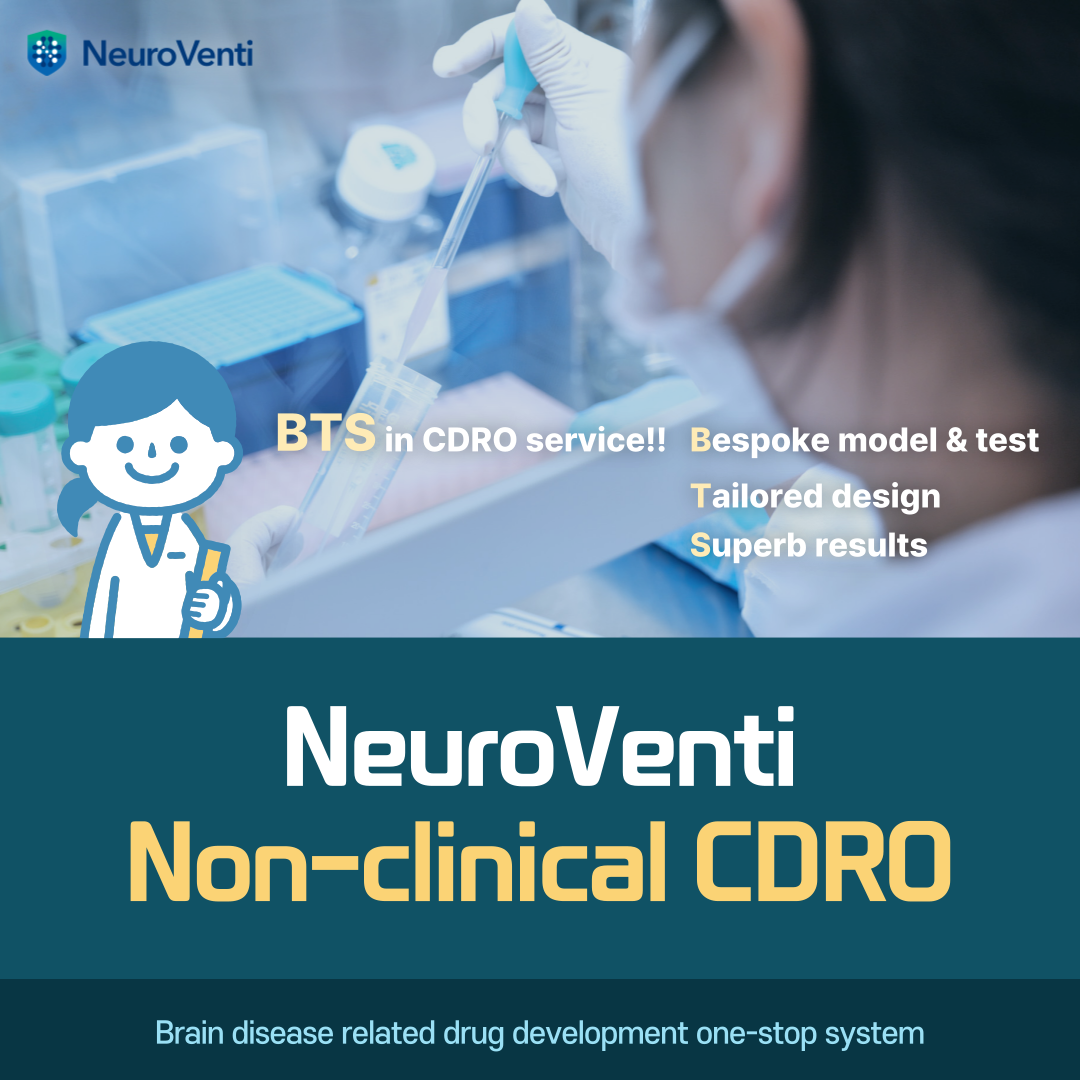Neuroventi 「Non-clinical CDRO service」
페이지 정보
본문
[One-stop solution for developing new drugs related to brain diseases]
Nuroventi non-clinical CDRO service
What is a non-clinical CDRO company?
Non-clinical CDRO is an animal clinical trial entrusted institution in the process of drug, food, cosmetics, etc. development, research and development consulting as well as research and development service that evaluates the efficacy and safety of drugs targeting laboratory animals in the pre-clinical stage. refers to an institution that provides As a professional non-clinical CDRO service provider specialized in central nervous system diseases, Neuroventi has expertise in candidate discovery, mechanism of action, efficacy evaluation, and side effect verification in the field of central nervous system diseases. Consulting and research services can be provided.
Why Neuroventi?
- Central nervous system disease specialist
- Comprehensive consulting based on unrivaled experience and know-how
- One-stop system from candidate discovery to optimization
- Provides the only side effect verification platform in Korea
[New drug consulting business]
Comprehensive consulting service for new drug development related to brain diseases
1. Overall pharmacological consulting on brain disease treatment development (design consultation, direction setting, result interpretation)
2. New drug development service related to brain disease: One-stop platform from modeling (in vitro, in vivo) to efficacy search
1) Production and supply of simulated brain disease models
2) Derivation of effective substances through mass screening of drugs
3. Central nervous system disease side effect profiling
[Owned cranial nerve disease animal model system]
1. Depression:
- Acute restraint stress, chronic restraint stress, maternal deprivation
- LPS, Corticosterone Injection
2. Schizophrenia:
- Social stress model (social isolation, social defeat)
- Injection of MK-801, PCP, amphetamine, Poly(I:C)
3. Alzheimer's disease/dementia:
- 5XFAD transgenic mouse
- BCCAO model, DM-induced dementia model, chronic LPS, scopolamine, Aβ injection
4. Parkinson's disease:
- 6-OHDA, Rotenone, MPTP Injection
- AAV-A53T alpha-synuclein overexpression, A53T transgenic mice
5. Attention Deficit Hyperactivity Disorder:
- SHR, Fmr1 KO mice
- MK-801, EtOH Injection
6. Autism Spectrum Disorder:
- CNTNAP2 KO mouse, Fmr1 KO mouse, AGMAT transgenic mouse
- VPA, Poly(I:C) Injection
7. Stroke:
- Photothrombosis, MCAO model, ET-1 injection
[Efficacy evaluation and mechanism research system]
In vitro efficacy evaluation and mechanism research system
1. Cell culture model:
- Primary neuron/astrocyte/microglia culture, Neuronal precursor cell culture,
- Organotypic brain slice culture
2. Utilized cell lines:
- HT22, Neuro2A, N27, SH-SY5Y, PC12, C6 glioma, BV-2, bEnd 3 cell
3. Neuronal cell death and branch control:
- Incucyte zoom live cell imaging system
4. Regulating mitochondrial function:
- OCR: Seahorse XF Cell Mito Stress Analyzer system
- Fusion/Fusion: ICC (Immunocytochemistry)
- ROS: imaging using mito SOX/Mitotracker
5. Neurotransmitter fluctuations:
- Fast scan cyclic voltammetry
- Functional reuptake assay (NET, SERT, DAT)
6. Synaptogenesis and Change:
- Synapse Analysis: EM Analysis, Confocal Imaging
- Synaptic protein changes: WB, IHC/ICC (PSD95, synaptophysin, synapsin, SNARE etc)
7. Neurogenesis and Differentiation:
- Proliferation: Immunostaining (Ki-67, BrdU, Nestin, doublecortin)
- Differentiation: tPA/PAI-1/MMPs zymography system, Immunostaining (Tuj-1, NCAM, BDNF)
8. Search for sleep disorder medications:
- Expression of MT1/2 Receptors
9. Anti-oxidation and neuroinflammation control:
- Antioxidant enzyme system: HO-1, GSH, NQO1
- ROS measurement: DHE, DCFH2DA, MDA, 4-HNE
- Expression and secretion of various inflammatory cytokines: Q-PCR, WB, ELISA
10. BBB Penetration:
- Immunostaining: Tight junction molecules, GFAP, vWF, NG2, PDGF
- BBB integrity: Evans blue dye/IgG extravasation, brain edema measurement
11. Discovery of new targets:
- RNA sequencing, Epigenome sequencing, Transcriptome analysis
[Efficacy evaluation and mechanism research system]
Evaluation system by target
1. Sociality, social selectivity: Three chamber test/Home cage social test
2. Communication : Ultrasonic vocalization test
3. Repetitive actions: Marble burying test, Self grooming test, Nest building test
4. Hyperactivity, general behavior: Open field test
5. Exercise function: Beam walking test, Footprint test, Rota-rod test, Grip strength test, Grid walking test, Cylinder test
6. Concentration, cognition, memory: Barnes maze, Y-maze, Novel object recognition test, passive avoidance test, Morris water maze task, 5-Choice serial reaction time task
7. Depressive disorders: Forced swimming test, Tail suspension test, Learned helpless test, Novelty induced feeding suppression test, Elevated plus maze test
8. Impulsivity: Cliff avoidance test, 5-Choice serial reaction time task, Delayed discounting task
[Side effect evaluation system]
Evaluation method by behavioral domain
1. Dependence, addiction: Conditioned place preference test, Self administration test
2. Sleep disorder: sleep test (pentobarbital-induced sleep induction model, caffeine-induced sleep deprivation model), electroencephalography (EEG)
3. Sensorimotor gating: Prepulse inhibition test
4. Convulsions: seizure intensity measurement, seizure onset time, seizure duration, recovery time, seizure behavior measurement, electroencephalogram (EEG)
[We promise 5 things]
Our Neuroventi CDRO is
1. Comprehensive consulting: Presenting the best direction based on unrivaled experience and know-how
2. One-stop system: One-stop progress from candidate discovery to optimization, efficacy evaluation and mechanism research
3. Optimal solution: Optimal efficacy evaluation system suitable for consumer needs
4. New target discovery: AI-based mechanism of action and target verification, new target discovery, etc.
5. Side Effect Profiling: Securing drug development safety through side effect evaluation system
[Joint research and non-clinical CDRO service]
1. Research consultation and referral
2. Estimation and contract: research purpose, model selection, evaluation method establishment
3. Establishment of research plan: preparation of plan, preliminary experiment, review, resetting evaluation method
4. research progress
5. Reporting of research results: interim report, review, final result report
6. end result
[way to come]
A. 401 Daebu Building, 15 Seolleung-ro 121-gil, Gangnam-gu, Seoul, Korea
T. 02-540-5630
F. 02-548-5630
E. contact@neuroventi.com
- Click the link below to apply for CDRO!
http://www.neuroventi.com/bbs/write.php?bo_table=online

